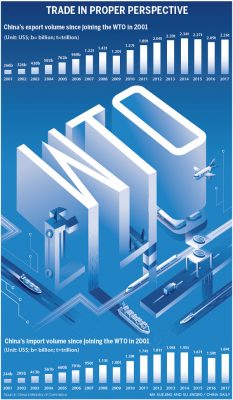
China spearheads efforts to reorient the WTO amid a rising tide of unfair protectionism
President Donald Trump-led US administration may be fond of trade tariffs and protectionist measures, but how anachronistic such an approach in the age of the World Trade Organization is, becomes starkly evident in Port Elizabeth.
On the outskirts of South Africa’s shipping hub, machines at busy manufacturing facilities create a robust hum that is as manly as the products they create: all kinds of trucks, cars and other customized commercial vehicles.
Here, automobile-makers such as China’s FAW Group Co and Beijing Automotive Industry Corp or BAIC produce vehicles with the help of Japanese and German industrial robots that assemble and spray-paint parts.
The finished products are loaded onto a vehicle carrier of a French company, to be shipped to Port of Djibouti, for clients that include Ethiopian Airlines and the Ministry of National Development of Eritrea. Many vehicles are also dispatched to customers across the rest of the world.
Conceivably, if their dispatch is disrupted or delayed for whatever reason, all hell will likely break loose across the globalized world.
Port Elizabeth offers two unmistakable lessons: one, that this is an economy-first world where smooth and rule-bound international trade is essential; and two, any disruption to trade will likely entail potentially catastrophic consequences.
Industry observers said these lessons ought not to be lost on the Trump administration, which has been creating chaos in the global trading system through its unilateral tariffs.
Such tariffs, designed to hurt many economies such as China, Russia, Turkey, Mexico and the European Union, also underline an urgent need for solid universal rules for global trade, they said.
Although China joined the WTO in 2001, it has since shared its manufacturing prowess, technologies, investment and access to its markets with the rest of the world. In the process, it has become an indispensable member of the global trade, helping stabilize the system.
“Without WTO membership, it would have been impossible for China to seize the rare window of opportunity and time to boost its economic development,” said Mei Xinyu, a researcher at the Beijing-based Chinese Academy of International Trade and Economic Cooperation.
But, international cooperation that took decades to crystallize, is now under threat from rising protectionism and unilateralism of the kind that the United States has embraced in recent months, experts said.
That threat comes with embedded risks like a major economic decline, job losses and stunted growth in all countries, which could hit the world’s poorest the hardest, senior Chinese officials said.
Hence, certain reforms are needed to defend the vital role of the WTO and the multilateral trading system, they said.
A global wave of restrictive measures like higher tariffs and stricter customs regulations has been threatening to drown international trade.
The latest WTO report indicates that from last October to this May, trade restriction measures across the globe, including tariff and stricter customs regulation, increased, impacting a total trade volume of about $84.5 billion.
Roberto Azevedo, director-general of the WTO, said increasing trade restrictions may become a new normal for global trade in the near future.
That would threaten the global economic recovery and hurt growth as well as job creation, he said.
He further said the WTO will engage more with leaders of major world economies and provide, if asked, consultations within the WTO framework and rules.
Eager to improve its standing and effectiveness, the WTO has struck major deals like the Trade Facilitation Agreement, the abolition of agricultural export subsidies and the expansion of the Information Technology Agreement in recent years.
“This work must continue – and indeed discussions are continuing on a range of issues which are vital for growth and development in today’s economy,” said Azevedo.
Even though conversations on the WTO reforms are already underway among world leaders and some have been floating ideas, consensus has been elusive. There is no clarity yet on where such discussions should lead and what areas may be more promising or more necessary to address, according to Azevedo.
Experts said the world’s march toward full globalization has been slow after the Doha Round of World Trade Talks, which were ended by the WTO’s General Council in 2006 because of a number disagreements on issues like trade in agricultural products.
Regional and bilateral free trade agreements were being signed one after another by both developed and developing economies. Observers believe such agreements may weaken the WTO’s power.
“Whatever the answers may be, there’s no doubt that we need to redouble all our efforts to ensure the global trading system is more responsive both to the members’ needs and to the challenges of a changing global economy,” Azevedo said.
Researcher Mei said an increasingly inward-looking economic approach adopted by the US may not blunt China’s competitive edge in global trade and the world economy.
But the unfavorable developments will make it more difficult for many developing and less-developed countries to emulate China’s export-led economic growth model to expedite their own economic development.
Wang Shouwen, China’s vice-commerce minister, said under such circumstances, China will continue to support WTO reform, and hope any such reform would address the concerns of most members and reflect their needs.
“China hopes that the primary purpose of the WTO should not be changed and its fundamental principle not challenged through gradual reform,” said Wang.
At the same time, China’s Ministry of Commerce said WTO reform should strengthen the latter’s authoritativeness and leadership, and consolidate the basic functions and role of the free trade principle and multilateral trading system, to better promote global free trade and economic globalization.
“We should always stick to the overall framework of the multilateral trading system and uphold multilateral trade order,” said the ministry’s spokesperson Gao Feng, adding free trade arrangements among WTO members are a helpful supplement and a positive driving force for the multilateral trading system.
Though China could rely on its own resources alone to advance its industrialization, it is still willing to seize development opportunities overseas and share its experiences and economic gains with its trading partners via imports and foreign direct investment, said researcher Mei.
“Because the country knows its biggest contribution to the world would be doing a good job at home and ensuring stable and sustainable economic development, China will hope that its goodwill wins fairer treatment for its personnel, goods and capital abroad,” Mei said.
No WTO member has suffered economically due to China’s participation since 2001. On the contrary, all of China’s trading partners at various developmental stages have benefitted greatly. China has also become a major trading partner of more than 120 countries and regions, he said.
For example, US exports to China surged from $26 billion in 2001 to nearly $150 billion in 2017. China thus became the third-largest market for US exports, up from No 11 in 2001, according to commerce ministry data.
China has also strengthened its legal system and law enforcement to protect intellectual property.
In recent years, it has revised the trademark law, and strengthened it by introducing a punitive compensation system, while revising the Anti-Unfair Competition Law and expediting the process for revising the Patent Law and Copyright Law.
It has re-established the National Intellectual Property Bureau, too, and emphasized that the judicial system will play the leading role in intellectual property protection.
Toward that end, it has established three intellectual property courts in Beijing, Shanghai and Guangzhou, while cracking down on online piracy to protect patent rights.
Since 2001, the royalties China had paid for using foreign patents increased on average 17 percent a year to reach $28.6 billion in 2017.
A number of foreign business leaders agreed that China, the world’s largest consumer market, offers enormous opportunities to global trading partners under the WTO framework.
Denis Depoux, who heads the China unit of German consulting company Roland Berger, said China has benefitted significantly from the WTO rules. Having been the world’s factory, China is now starting an influential trend by growing its domestic market, upgrading the quality of its products and services, and enhancing environmental requirements in its manufacturing and industrial sectors.
“More opportunities, including a level playing field for global companies, are arising in China for those who can adapt to this new trend. Outbound Chinese investments, although selectively authorized in the past, will also transform the country’s economic influence,” said Depoux.
George Xu, CEO of the China unit of French aircraft-maker Airbus, said there will be huge growth potential in China’s civil aviation market in the next decade.
“In recent years, outbound tourism has grown rapidly, but only about 10 percent of people in China hold passports. If that number grows to 20 or 30 percent, it will be a massive market, and we can foresee that the market will grow robustly,” he said.
China is the largest market for Airbus that has seen its highest growth rate in the country. It delivers about one-fourth of its planes to the Chinese market every year.
“Twenty years ago, most multinational companies simply wanted to manufacture in China, but the nature of demand is very different now. They are seeing China as an end market. That means they need to change dramatically,” said Bill Winters, group CEO of Standard Chartered Bank.
Amid growing concerns over isolationism and protectionism, German chemical giant BASF announced in July that it will invest $10 billion to build a chemical production site in South China’s Guangdong province. This would be BASF’s largest investment project ever. The investment is estimated to reach up to $10 billion by the project’s completion around 2030.
By then, the WTO regime will have been strengthened on the back of China-led efforts, and Guangdong and many other cities across the world should be able to emulate Port Elizabeth, to emerge as shining symbols of an efficient, just and equitable global trade system, experts said.


